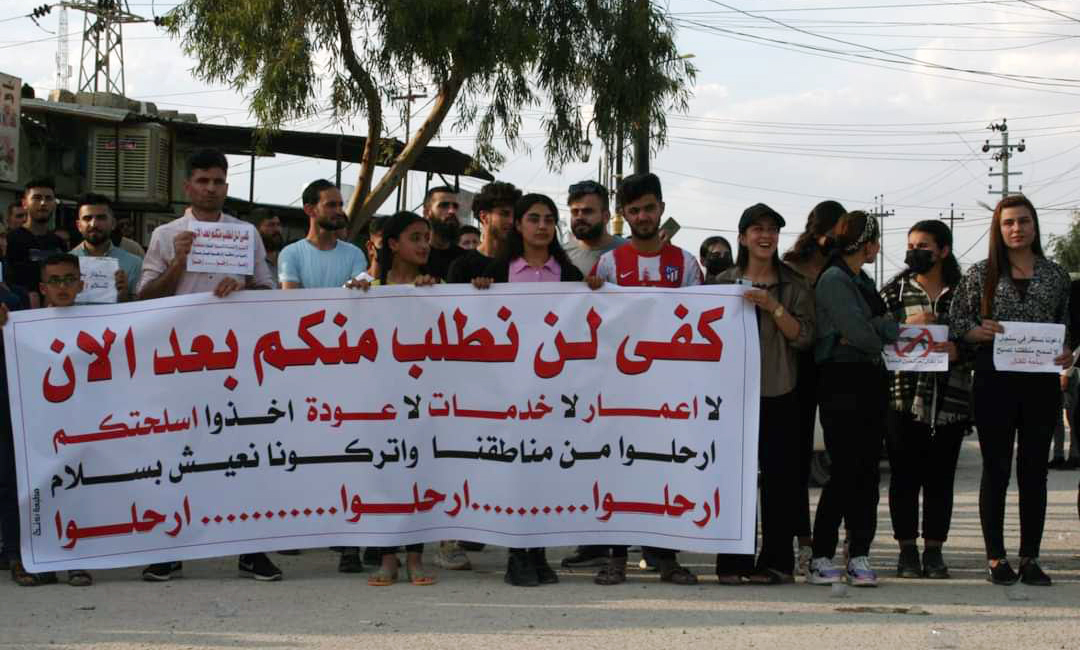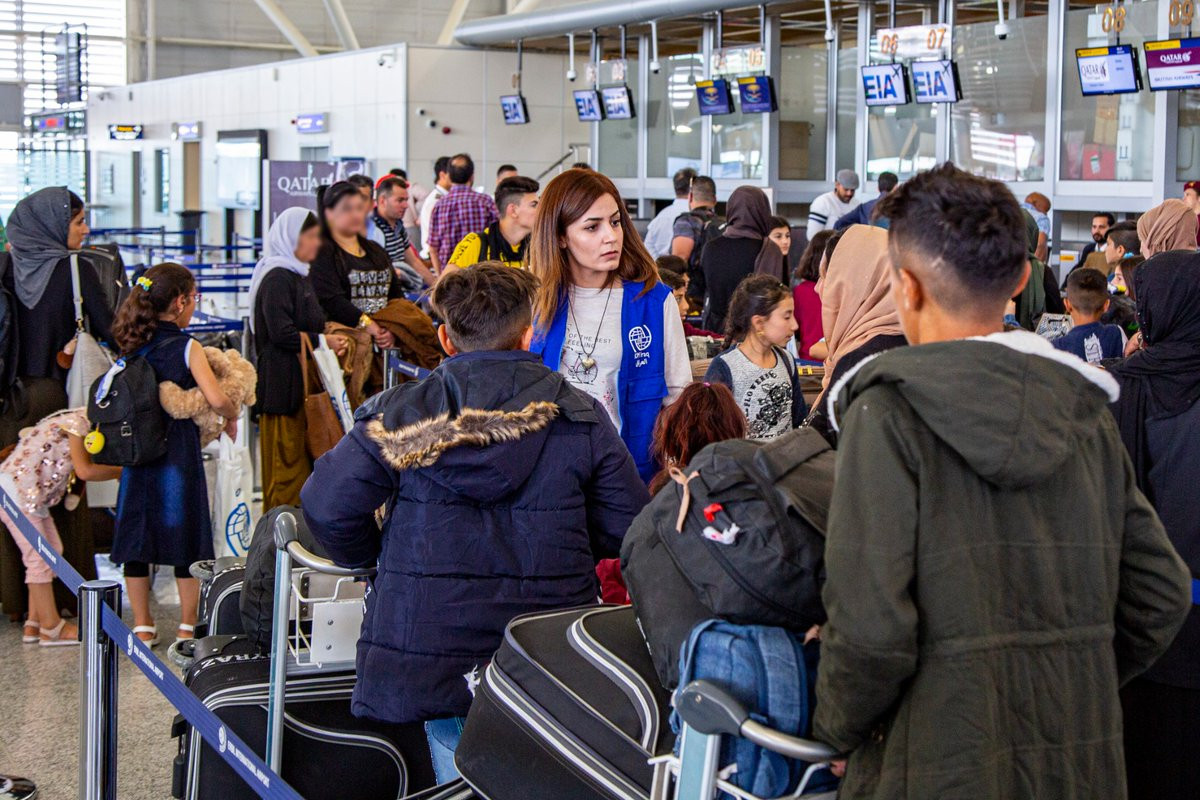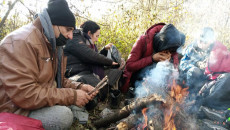After eight years spent in camps for the Internally Displaced Persons IDPs, Sufian Dakhil could no longer bear life under tents, so he decided to take illegal migration routes in the hope of reaching Europe.
Sufyan is 21 years old and from the Borik complex in Shingal (Sinjar) district, home to the Ezidi (Yazidi) community slaughtered at the hands of the Islamic State ISIS for being non-Muslims.
This young man was displaced with his family following IS attacks in 2014, and they were sheltered in Mam Rashan camp in Dohuk governorate.
"Your future is shrouded in uncertainty in Iraq and Kurdistan. When I was in the camp, I worked hard, worked with two humanitarian organizations, taught children sports, obtained six certificates, but all of this did not help me, in 2019 I left school and this year I decided to emigrate," says Dakhil.
On August 1, 2022, he left the IDP camp towards Turkey, away from his family, and faced the difficulties and dangers of illegal immigration until he arrived in Greece.
Every day, between 10 to 15 migrants, most of them Ezidis, flock to the camp in which I am staying in Greece
"I stayed three days and nights without water or food on the way to Greece, and I saw death with my own eyes."
Dakhil is waiting at camp in Greece for the appropriate opportunity to resume his journey again in order to reach the Netherlands to start a new life there, after he got desperate in camp and no glimpse of hope in his war-torn region.
"Every day, between 10 to 15 migrants, most of them Ezidis, flock to the camp in which I am staying in Greece," he added.

According to a follow-up conducted by KirkukNow correspondent, the past two months witnessed the start of a new wave of immigration of young Yazidis toward Europe, especially among the displaced people residing in the camps of the semi-autonomous Iraqi Kurdistan Region IKR.
The Ezidis constitute 30% of the 664,000 IDPs. Last May, thousands of Ezidi families were again displaced from their hometowns to the IDP camps again due to the tension and armed clashes that erupted in the area between the armed groups.
Sherzad Pir Musa, head of the Aland Organization for Youth Democratization in Dohuk - a non-governmental organization NGO established in 2006 - told KirkukNow, "We collect immigration statistics weekly, and according to the latest statistics, 1,273 Ezidis have migrated during the past 20 days."
About 85% of the Ezidi youth who migrated were residents of the camps and the rest were from outside the camps, the largest proportion of the migrants were from the Sharya, Kabartw and Cham Mishko IDP camps in Dohuk Northern Province.
"Illegal immigration of Ezidis is fraught with dangers yet it is ongoing," says Pir Musa.
According to the follow-ups of (KirkukNow), one of the main reasons for the migration of Yazidis is the massive destruction caused by the war against IS in the Ezidi region, the lack of security, stability and services, as well as the hardships of life under tents, as previous reports by (KirkukNow) showed that hundreds of families suffer from the decline in aid, water scarcity and the poor quality of the food ration items distributed by the Iraqi government.
These displaced people have been living under tents for eight years and have lost hope of returning to Shingal
Dayan Jaafar, head of the Department of Migration and Displacement in Dohuk under the Kurdistan Regional Government KRG, said, "These displaced people have been living under tents for eight years and have lost hope of returning to Shingal, so they take advantage of any opportunity that comes before them to emigrate.”
The current wave of immigration began following rumors of opening illegal immigration ports to Greece, he added.
“There are no official statistics on the number of Ezidis who have emigrated, all we know is that most of the immigrants are young."
During the past years, dozens of Ezidi familieswere relocated to France in several stages under an agreement between France and the International Organization for Migration IOM.
Darwish Chuki, head of the Tolay Organization for Survivors and Victims - a humanitarian NGO concerned with ISIS victims - affirmed, "Since last July, a new wave of Yazidis has been emigrating, and according to our follow-up, every day over 50 people from the camps and Shingal migrate."

The statistics by Tolay indicate the migration of nearly three thousand Ezidis since last July.
“There are women, children and girls among the people who migrate every day, they are all taking illegal immigration routes and their numbers are increasing,” says Chuki.
In the wake of the ISIS attack on Shingal and other areas of Nineveh Governorate, more than 350,000 Ezidis were displaced, 100,000 of whom migrated at the time outside Iraq. The extremist militants of IS kidnapped six thousand Yazidis, the fate of nearly half of whom is still unknown, according to KRG statistics.
Herman Mirza Beg, Deputy of Yazidis’ Emir for Youth Affairs, acknowledged the start of the new wave of Yazidis immigration, but he refused to link these numbers to the Yazidis only, pointing out that the migration included the young people of other components as well.
"The issue has been exaggerated politically and, in the media, as the total number of Yazidis who have migrated during the past four months does not exceed 500 people,” Mirza Beg thinks.
We cannot prevent them from doing so, but we are trying to reduce it
He believes, “the financial conditions of those who choose to emigrate are very bad and cannot prevent them from doing so, but we are trying to reduce these immigration rates.”
With the exception of Ninewa, the Iraqi government closed the IDP camps in all other governorates and they were returned to their areas of origin, except for the IKR camps, which were maintained under an understanding between Baghdad and Erbil.
The only way that the Iraqi government stresses to solve the problems of Shingal is to implement the 2020 Agreement between the Iraqi federal government and the KRG to form a new administration and reorganize the security and service but the terms of the agreement have not been implemented so far as several armed groups are deployed there, acting out beyond control of Baghdad and Erbil.
Shingal, 120 km west of Mosul, is part of the disputed territories and administratively follows the Nineveh Governorate. ISIS militants attacked the district on August 3, 2014, and it was recaptured on November 13, 2015.





